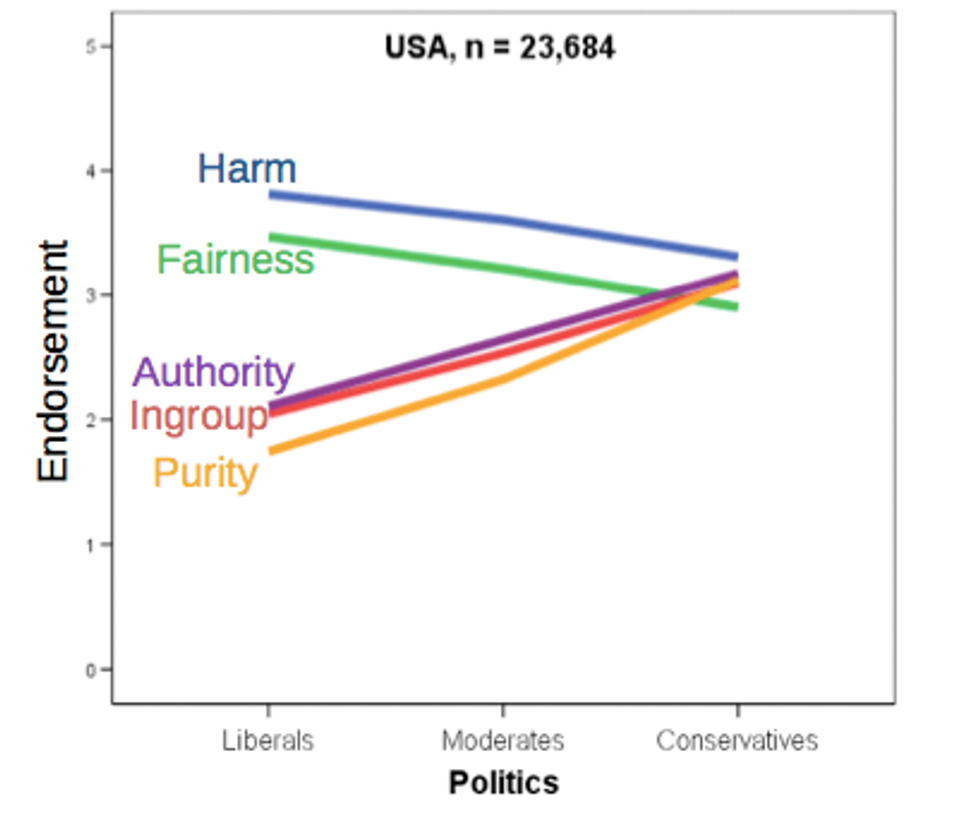"Nature always does contrive / That every boy and every gal / That’s born into the world alive / Is either a little Liberal / Or else a little Conservative!"
– Gilbert and Sullivan, “Private Willis”
If you have ever been in a political argument, you may have felt frustrated at one point that the other person would not change their mind. You were obviously right, so why couldn't they see it?
As Adrian Moons pointed out in his article “How To Be Chill In A Political Discussion,” people often form their political opinions before they rationalize them with logical arguments. Core values are often assumed without being supported in political debates. The question of how people reach those values is then a mystery — but relatively recent findings in moral psychology can answer it.
Brain scans comparing liberals and conservatives, for example, have found size differences in some brain regions. Liberals have a larger ACC (anterior singulate cortex) than conservatives, whereas conservatives have a larger amygdala. The ACC is involved in processing uncertainty as well as higher-level decision-making and evaluation. The amygdala, on the other hand, is essential in producing automatic emotional reactions, especially to threats. Some concluded that this research confirmed several stereotypes of the two groups: “liberals tend to be better at managing conflicting information, while conservatives are though to be better at recognizing threats.”
As Dr. Ben Hayden points out, though, researchers should not jump to conclusions in political psychology based only on comparing the sizes of different brain structures. It is not always clear that a bigger brain structure means that people perform the function of that brain structure more effectively. While his caution is understandable, there is plenty of other evidence supporting the idea that liberals and conservatives differ primarily based on their automatic emotional reactions to things that seem threatening.
If I showed you a picture of something disgusting and then scanned your brain, I probably could figure out your political orientation without asking a single question about your opinions. Your values are deeply connected to a single variable which is expressed in a variety of ways: how do you react to something you don’t like? The more that you react with disgust and aversion, the more likely you are to identify as politically conservative.
Researchers have also discovered that "liberals consistently score higher on a personality measure called 'openness to experience.'" Openness to Experience is one of the five dimensions in the Five Factor Model, the most widely accepted personality measure available. It measures imaginativeness, creativity, "aesthetic sensitivity, ... preference for variety and intellectual curiosity."
It is not entirely as simple as "liberals are curious and conservatives are grounded," however. Researchers of moral psychology have discovered five foundations of morality, different standards that people figure out if something is moral.
1. Do not harm others.
2. Be fair to everyone.
3. Respect authority.
4. Be loyal to your group.
5. Be clean and pure.
A key psychological difference between liberals and conservatives is which foundations they prioritize:

These findings about moral foundations confirm and clarify the one difference described earlier, that liberals and conservatives react differently to something strange and negative. Purity shows a clear connection to how people react to disgusting images, since people generally think "impure" and "disgusting" are synonymous. Authority and ingroup loyalty make sense on the opposite side of a spectrum from Openness to Experience, since intellectually curious people with a preference for variety are probably less likely to think it is best to stick to one's own group or to trust authority figures to know what is right.
Psychological research then paints a basic picture of the differences in liberalism and conservativism, as they are felt at their emotional core by liberals and conservatives. Conservatives want stability and distrust what seems dangerous, trusting in societal institutions to prevent chaos. Liberals are indifferent to societal institutions, seeking out new ideas to try to help everyone in a fair and equal way.
To clarify, these findings do not mean that everyone is born into a political affiliation and stuck in it forever. Changing someone’s mind in a political discussion is possible, albeit difficult. The research is based on averages, not absolutes. Most people tend to keep one political affiliation based on their genetics, but plenty can still change their minds based on experiences — especially if they fall somewhere between the extremes in their values and response to negative things.
Both perspectives can be helpful in trying to advance society. Liberals help to pull society forward along new paths to help more people. Conservatives then make sure that the liberals don't pull society off of a cliff in their eagerness for change. In a kind of yin-yang effect, they can help to balance each other out.
Fundamental disagreements between the two groups do exist and are deeply rooted in human psychology. Knowing the nature of these disagreements can help you understand the perspective of the "other side," and on a larger scale, it can help make the dialogue between the two sides more informed and cooperative.
For more information on this subject, watch this TED Talk by Jonathan Haidt:





















